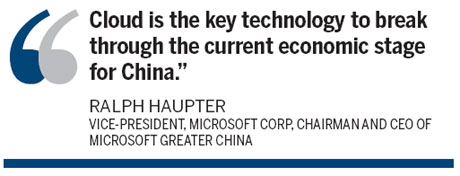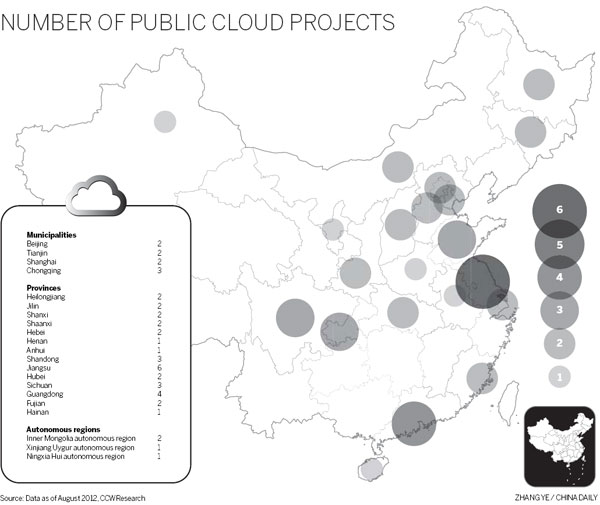Companies' future is in the cloud
Updated: 2013-01-21 07:55
By Gao Yuan (China Daily)
|
||||||||
|
The number of Chinese companies launching cloud-computing projects will increase sharply this year as they believe the new technology will help lower hiring, contracting, acquisition, testing and maintenance costs. Provided to China Daily |

New technology to power, shape China's industrial transformation
China's cloud-computing market is seeing an "explosive increase" and will continue in similar fashion until at least 2015, according to industry experts.
"The nation's more than 550 million netizens and tens of millions of companies are set to generate tremendous demand for the cloud-computing industry in the next three to five years. The cloud will power China's transformation and upgrade processes across every industry," said a report released by CCWResearch, a think tank for China's IT industry watchdog.
Cloud computing will help companies reduce employment, contracting, acquiring, testing and maintenance costs. Hence, investment in this technology will help companies save money in the long run, said Paul Dean, managing director of global consultancy firm Accenture's technology department in Shanghai.
The number of Chinese companies launching cloud-computing projects last year was unprecedented, analysts said, although no data was available.
These companies invested roughly 18.8 billion yuan ($3 billion) on new cloud-computing facilities in 2012, a 48.1 percent year-on-year growth, said CCWResearch, adding cloud-related services contributed another 94.7 billion yuan to the industry.
Heavy investment is expected to push the annual growth rate of the industry five times faster than the average level of the IT industry, it said.
"Cloud computing may create approximately 5 million job opportunities and more than 2.2 trillion yuan in output value across different industries in the next four years," CCWResearch estimated.
Cost benefits
"For a company that has diverse subsidiaries and a sophisticated corporate structure, cloud computing is the best solution to improve communication costs," said Guo Song, chief information officer at Xiamen CCRE Group Co, a Fujian-based manufacturing conglomerate and the parent company of China's passenger carriage flagship Xiamen King Long Motor Group Co.
The group recently finished building a grassroots-to-boardroom information platform that links its more than 20 subsidiaries. A corporate cloud-computing center is the core of this platform.
That the game is on for cloud service providers is more than evident as more companies are showing an interest in the technology on hopes that it will help reduce operational costs and increase productivity amid the gloomy global economic environment.
"Cloud is the key technology to break through the current economic stage for China," said Ralph Haupter, vice-president of Microsoft Corp, chairman and CEO of Microsoft Greater China.
Cloud computing gives growing economies, which always struggle to find a balance in the rapidly changing economic environment, an efficient tool to optimize their investment while enjoying a high degree of flexibility, he said.
"These advantages will encourage more enterprises to adopt cloud technology, thereby limiting the decision-making risks. Through cloud-computing centers, customers will able to move statistics to the cloud, and then choose whatever data they want," said Haupter. "It also gives executives flexibility from the perspective of productivity and data application."
In September, Microsoft launched Windows Server 2012, a cloud-based server operating system targeting small- and medium-sized enterprises.
The company is also mulling on introducing Windows Azure, its cloud-computing platform, in China.
"You have to really be careful while addressing the Chinese market, as it is important to fully understand the prevailing conditions in the local market," said Haupter. "You have to pick an area that is in line with the government's long-term development strategies."
On July 9, China announced its support to seven major emerging industries that are considered important for the overall growth strategy. The information technology industry is a part of this agenda, while cloud computing is a key area under it.
The government plans to encourage innovation in the cloud-computing industry and also set up labs to speed up its business use.
More than 600 Chinese cities will upgrade their IT infrastructure to spur domestic consumption during the 12th Five-Year Plan (2011-15). The Smart City idea is set to boost emerging Internet services such as "the Internet of things" and cloud computing.
"Local governments are set to push the development of the cloud-computing industry because they hope this new technology will help the government boost efficiency and better analyze the increasing amount of unstructured statistics," said Adrian Chan, Greater China president of NetApp Inc, a United States-based data management company.
"In addition, the nation's small- and medium-sized enterprises will also need this technology to rein in increasing costs and improve service levels," said Chan.
Last year, NetApp teamed up with Microsoft to set up a cloud-based information platform for Jin Jiang International Hotel Management Co, the nation's top hotel management company.
The new platform has simplified the maintenance process and improved the reliability of the system, according to Jin Jiang Hotel. But it did not disclose how much operating cost the new platform helped save because the system was just put into use.
SMEs are the most ideal candidates for cloud services, as they enable firms to make flexible IT input in the most cost-effective manner, said Dean from Accenture.
Cloud services, in essence, are the ability to source, scale and deliver capacity, and are not bound by physical location or labor, Dean said.
"The ability to make use of a resource no longer depends on the ownership of that resource. This means that IT must transition its provider centric role of building, implementing, managing and supporting solutions it develops in-house to one that provides standardized solutions customized to the business function provided by external parties," he said.
Ground realities
According to CCID Consulting, the turnover of China's cloud market is doubling every year and is estimated to reach 117.4 billion yuan by the end of this year. Four years ago, the cloud was still a concept that was considered too fancy and unrealistic by most of the Chinese entrepreneurs.
A popular saying among the chief information officers of Chinese companies in 2008 was: "Cloud is too illusory and up in the sky, to do corporate IT you have to be down to earth."
China's cloud-computing industry started to enjoy a rapid growth after companies realized that the technology will increase data use efficiency and help decision making, said CCWResearch. It expects further fast development in China until 2015, around the time that most Chinese customers finish their cloud upgrading works.
"By 2015, the cloud will be just a generic name for common as-a-service delivery modes for supply of business and IT services," said Chris Morris, associate vice-president of IDC Asia Pacific.
Because virtually every competitor will adopt cloud-computing services, the cloud-marketing label will enjoy "negligible value" for competitive differentiation, he said.
Traditional industries such as education, finance, energy and telecommunications will fully embrace cloud technology in the coming years. As China is keen to upgrade traditional industries in a bid to boost domestic consumption, cloud-computing providers will receive more customers, industry experts said.
The future landscape will be the convergence of the private cloud and the public cloud as well as the hybrid model, where the cloud coexists with the companies' current IT infrastructure. Each one is going to drive one another, said Dean.
"While a private cloud may reduce security concerns, the public cloud will also have its own business services being defined and offered. For SMEs, it makes more sense to procure those services from the public and build, integrate them into the private networks," Dean said.
Currently, many third-party companies are looking at migrating from just licensing to more of a service-oriented framework. It's actually good for SMEs, because you have a lot more options to orchestrate and integrate them into your own system, he said.
Cloud computing is expected to be a major driving force for the Internet business, and Chinese Web companies are already getting ready to do battle in this new industry.
Baidu Inc and Alibaba Group Holding Ltd have announced their own cloud strategies.
In August, Baidu's 47-billion-yuan cloud-computing center in Yangquan, Shaanxi province, started construction. It was the most expensive cloud-computing project set up by private companies. The center is slated to start operations by 2015 with a total storage capacity in excess of 4,000 petabytes. It is estimated that the normal human brain can store about 2.5 petabytes of binary data.
The nation's most used Web search provider will invest more than 10 billion yuan to set up its own cloud-computing centers, said a recent Reuters report.
Alibaba, an online commerce giant, has developed its own cloud-based operating system in a bid to explore the cloud market for personal use.
Challenges ahead
Looking forward, the nation's cloud-computing industry is full of opportunities but will also face challenges, analysts said.
China's vigorous cloud strategy is set to face challenges as the market continues to grow. For example, talent shortage may hinder further development of the industry, said Morris from IDC.
The importance of companies' IT talent inventory will determine how the company will adopt cloud-computing technology, he said.
Other challenges could be even more alarming.
According to the CCWResearch report, only about 20 percent of the nation's cloud-computing facilities have been put into actual use. Some heavily invested cloud centers are lying idle and become vanity projects, said the report.
"Most of the investment was used to build servers, data memories and other hardware infrastructure, but the investors failed to recognize how to facilitate the hardware and integrate cloud services to existing offline businesses," it said.
With construction of cloud-computing centers across the country slated to finish in three years, the industry is unlikely to see any more big investment deals like that of Baidu.
The government and companies have to realize that adopting the idea of the cloud is not as simple as setting up data centers. More importantly, the users will need a sharper vision in cloud-related sectors such as mobile Internet and a series of data analysis systems.
"The cloud can't be planned, funded or executed without ties to mobility, social, big data and industry transformation," Morris said.
Moreover, concerns over data security will also challenge cloud services because the core idea was to put all the information in a single place.
"The government should better regulate the country's cloud services in the future," CCWResearch suggested. "The regulators will need to closely watch the service providers in every sector and areas to guarantee the healthy development of the industry."
gaoyuan@chinadaily.com.cn
|
Chinese e-commerce giant Alibaba Group promoting its net.cn cloud-computing service at an Internet exhibition. In 2011, Alibaba announced plans to develop a cloud-based operating system for smartphones. Nan Shan / For China Daily |

(China Daily 01/21/2013 page13)

 In Photos: 7.0-magnitude quake hits Sichuan
In Photos: 7.0-magnitude quake hits Sichuan
 Li Na on Time cover, makes influential 100 list
Li Na on Time cover, makes influential 100 list
 FBI releases photos of 2 Boston bombings suspects
FBI releases photos of 2 Boston bombings suspects
 World's wackiest hairstyles
World's wackiest hairstyles
 Sandstorms strike Northwest China
Sandstorms strike Northwest China
 Never-seen photos of Madonna on display
Never-seen photos of Madonna on display
 H7N9 outbreak linked to waterfowl migration
H7N9 outbreak linked to waterfowl migration
 Dozens feared dead in Texas plant blast
Dozens feared dead in Texas plant blast
Most Viewed
Editor's Picks

|

|

|

|

|

|
Today's Top News
Live report: 7.0-magnitude quake hits Sichuan, heavy casualties feared
Boston suspect cornered on boat
Cross-talk artist helps to spread the word
'Green' awareness levels drop in Beijing
Palace Museum spruces up
First couple on Time's list of most influential
H7N9 flu transmission studied
Trading channels 'need to broaden'
US Weekly

|

|









